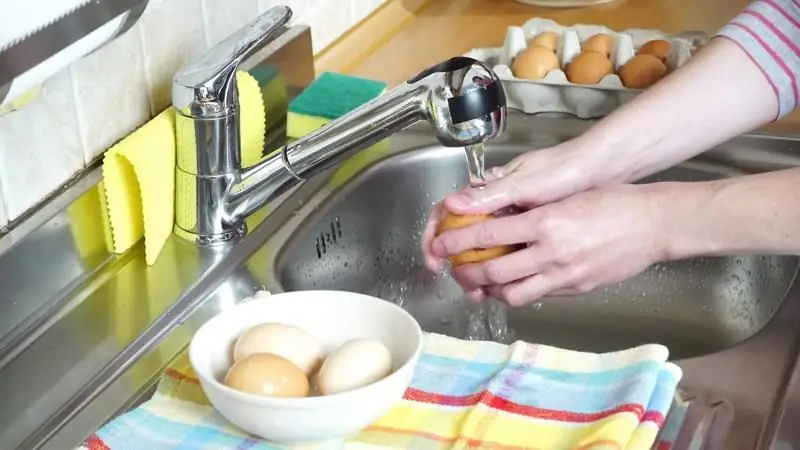
Table of contents:
- Author Bailey Albertson albertson@usefultipsdiy.com.
- Public 2023-12-17 12:53.
- Last modified 2025-01-23 12:41.
The eternal question: do I need to wash chicken eggs?

Most Russians are not used to washing chicken eggs - neither before cooking nor before storing. But some, especially attentive to hygiene, are happy to wash them with a brush or sponge after buying another dozen. Who is right? There is no definite answer, but there are several subtleties.
Why wash chicken eggs
If you are unlucky and you bought eggs from a laying hen with salmonellosis, then both inside the egg and outside, on the shell, bacteria can remain - salmonella. They are dangerous to humans. At temperatures of + 71 degrees Celsius and above, Salmonella bacteria die. So one way to reduce the risks is to simply heat the egg (boil, bake, or fry). However, even during storage, salmonella living on shells can move to other foods that you plan to eat fresh - for example, vegetables or fruits that accidentally end up next to eggs. The risk, of course, is minimal, but it is still present. And washing chicken eggs before storage largely protects from it.
There is another problem - dirt and droppings on the shell. Often on sale there are eggs covered with an unpleasant, earthy crust. If you are not very lucky, then when you break such an egg, you run the risk of spilling dried chicken waste products into your future omelet or pie. A small water treatment will protect you from this problem.

Rinsing eggs quickly before cooking will protect you from the risk of adding a little soil or chicken manure to your food.
Do I need to wash chicken eggs
It would seem that washing chicken eggs, for all its benefits, is an unequivocal benefit. But in reality this is not entirely true. The point is in the protective shell, which is located on the shell. Eggshells are known to have a porous structure. If you deprive it of its protective shell (and this is what happens during thorough washing), then the egg becomes more susceptible to the penetration of external unfavorable microorganisms through the pores. This leads to the fact that the shelf life of such eggs is sharply reduced. Compare - an unwashed table egg can be stored in the refrigerator for up to 120 days, and a washed one - only 7. The difference is noticeable, isn't it? In addition, washed eggs should only be stored in the refrigerator to prevent harmful bacteria from growing rapidly.
So what should you do? There are two options.
Wash before cooking
Washing immediately before cooking has two undoubted advantages: you protect yourself from unpleasant substances in food and, at the same time, you will be able to store raw eggs for a long time. However, this does not solve the problem of the risk of transferring salmonellosis to neighboring products. What to do?
It is known that the bacterium Salmonella ceases to multiply at temperatures from +7 and below. Therefore, you can store unwashed eggs in the refrigerator. But keep in mind that when stored in a door, the product is exposed to regular temperature changes. Because of this, the risk that the bacteria "jump" to other foods increases slightly. It is best to keep unwashed eggs close to the far side of the refrigerator compartment.
Another option is to store unwashed eggs at room temperature, but in a separate drawer.
Wash after purchase
Washing immediately after purchase is considered the safest option. You simultaneously reduce the risk of salmonella contamination and kill all foreign matter from the shell. However, this method assumes that you eat an egg within one week. Therefore, it is suitable for those who agree with such a shortened shelf life. A week after laying, it is strongly recommended to discard the washed egg - pathogenic microorganisms could already get into it and multiply. In addition, washed eggs can only be stored in the refrigerator. Room temperature is contraindicated for them.
Experts are still arguing when it is better to wash eggs and whether it should be done at all. Rospotrebnadzor has the following position on this issue - you need to wash eggs before placing them in the refrigerator.
Recommended:
How To Bleach The Soles Of Sneakers, Clean Them On Sneakers Or Other Shoes, Wash Them To White Using Various Methods + Photos And Videos
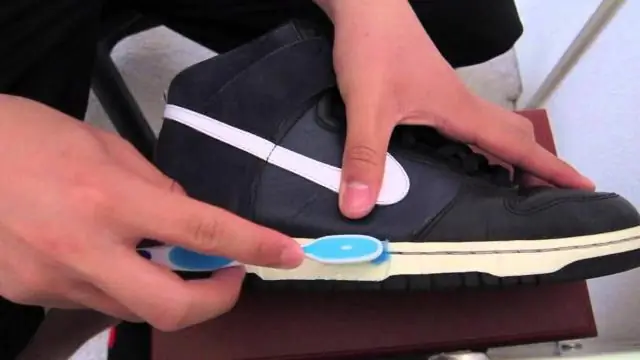
Shoes with white soles (sneakers, sneakers, etc.) - how to clean them quickly and easily. How to preserve the result after cleaning and protect it from dirt
How To Store Nuts At Home: How To Properly Peel Them, Whether You Need To Wash Them
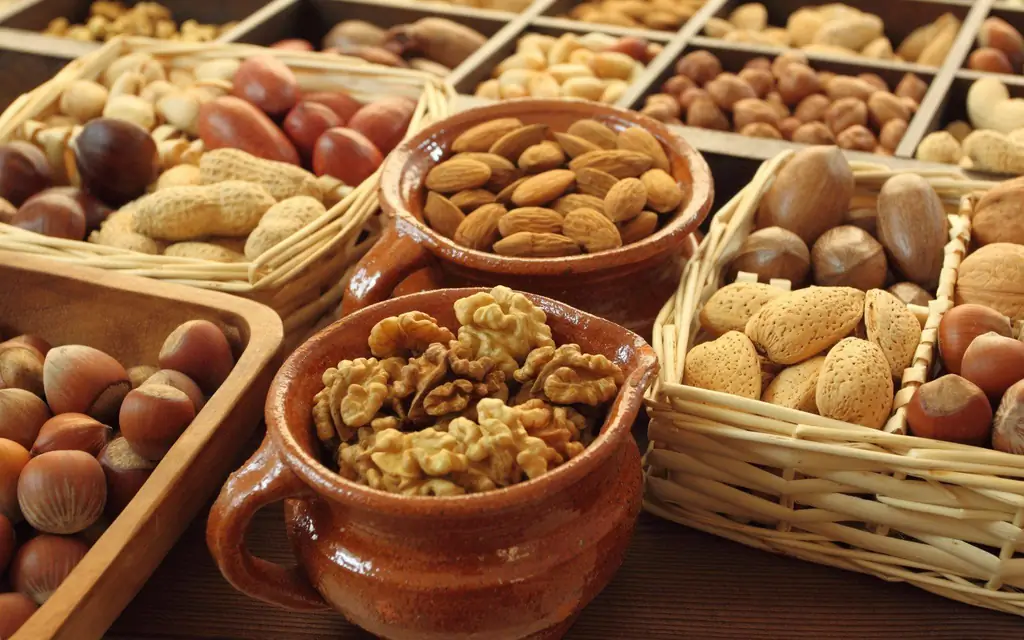
How to store nuts properly at home. How easy it is to peel them from the shell in different ways. How to prick to keep the core intact
Is It Necessary To Clean The Mushrooms Before Cooking, How To Do It Correctly, Is It Necessary To Wash Them
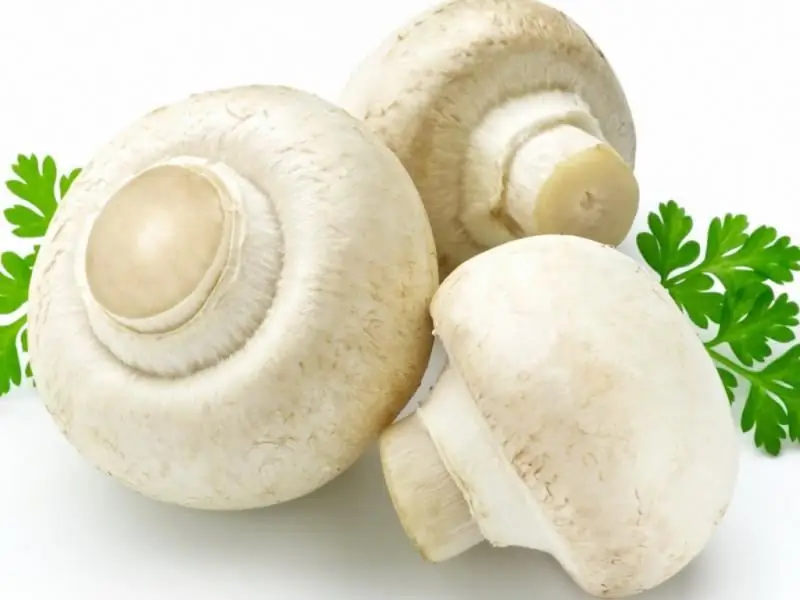
Do I need to clean and wash the mushrooms. Cleaning features for different cooking methods
Do I Need To Wash Nuts And Dried Fruits Before Eating
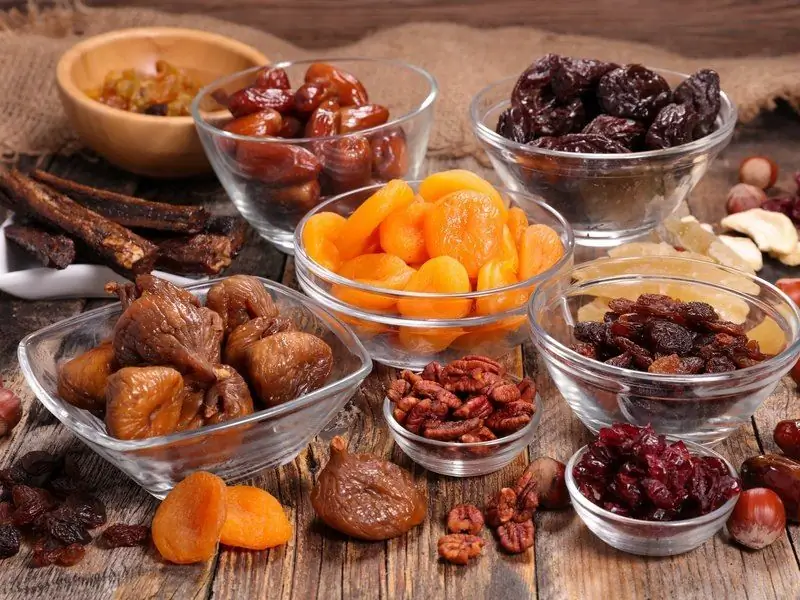
Why is it necessary to wash nuts and dried fruits before eating?
How To Properly Wash Makeup Brushes, How Can You Wash Cosmetic Sponges (including For Foundation), How Often You Need To Do It

How often and correctly you should wash your makeup brushes and sponges. Home and professional cleaning tools for cosmetic tools. Instructions. Video
